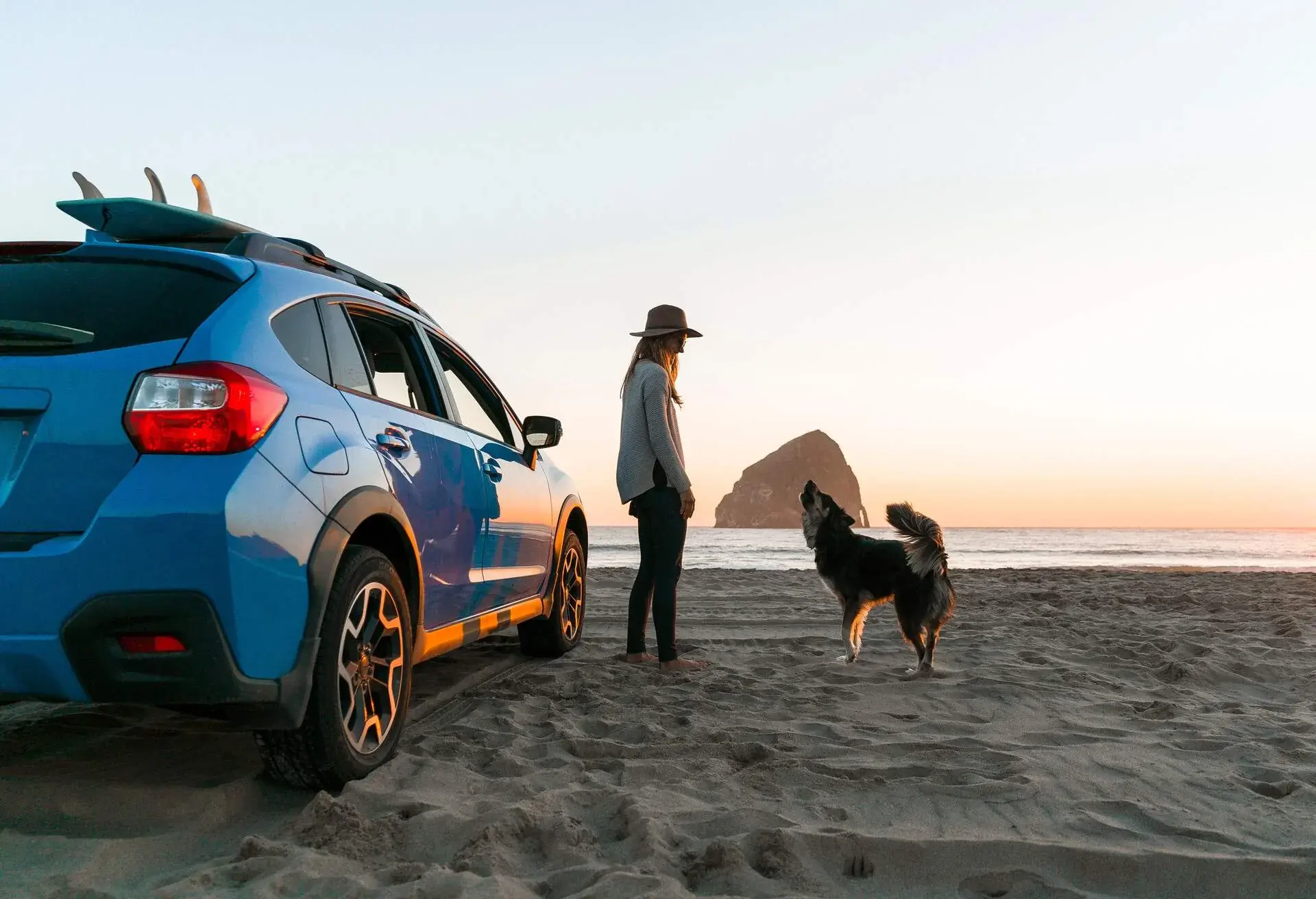Fancy a vacation on the road in the home country of the famous Autobahn? How about a Germany road trip? In this article, I share three exciting routes for a great road trip during a German summer or to see the best Christmas markets in December.
Even if you only have a week, there is much to do and see along the way. I am also giving you tried and tested tips to set your road trip budget and for choosing the best rental car.
Harbors, fairy tale towns and island breezes a road trip around Germany in 7 days and 540 miles.
Start in Hamburg – where harborside energy, warehouse vibes, and buzzing nightlife await.
Sightsee Sankt Peter-Ording, with wide beaches, stilt houses, and salty North Sea winds.
visit Sylt, Germany’s chic island escape of dunes, thatched roofs, and seaside charm.
Drive through Fehmarn, the sunny Baltic island perfect for biking and kitesurfing.
Explore Lübeck, a fairytale old town rich with Gothic spires and marzipan history.
Roam around Fischland Darß Zingst, a wild peninsula of windswept shores and migrating cranes.
Finish with Rügen, where chalk cliffs, seaside resorts, and forest trails meet the Baltic breeze.
Germany’s calling, you in? Search your perfect ride on KAYAK.
The key information for your road trip in Germany
| Best time to go: | May to July |
| Average cost for 2 travelers: Including 7 days of car rental, 7 nights in hotels, and gas. | Approx. $1,800 |
| Best car to rent: | Volkswagen Golf |
- Average price for a double room in Berlin: $152 per night
- Average price of a bed in a hostel in Berlin: $73 per night
- Average price of a rental car in Berlin: $75 per day
- Price for a gallon of gas in Berlin: $6.47*
*As of June 2025

Germany road trip itinerary - From the North Sea to the Baltic Sea
Pack your bathing suit, because this route takes you to the most beautiful beaches and places by the North Sea and Baltic Sea.
Day 1: Hamburg

Your road trip along the coast begins with a visit to the Hanseatic City of Hamburg. If the weather is nice, you can put your feet in the sand on the beach by the river Elbe and count the containers in the harbor. Visit the Elbphilharmonie for a concert or a tour of its famous plaza.
Where to stay in Hamburg: 25hours Hotel Hafencity, a cool city hotel with Nordic flair
Day 2: Sankt Peter-Ording
Distance from Hamburg: 87 mi - just under 2 hours
Enjoy the ocean breeze during a long walk on the beach in Sankt Peter-Ording. You can also jump on a board as windsurfing is the thing to do here. Alternatively, take a stroll along the pier and enjoy a bite to eat in one of the restaurants that are set up in iconic stilt houses.
Where to stay in Sankt Peter-Ording: Seaside 43, a beautiful wellness hotel by the sea
Day 3: Sylt

Distance from Sankt Peter-Ording: 80 mi - 2.5 hours including the journey by car train
Sylt is the destination for a seaside vacation and the Wadden Sea National Park awaits. It is best explored on a guided tour. Afterwards, you can admire the dunes and the Red Cliff, and enjoy a fish sandwich at the northernmost fish shack in Germany.
Where to stay on Sylt: Hotel Stadt Hamburg, a chic hotel in the middle of Westerland
Day 4: Fehmarn
Distance from Sylt: 155 mi - just under 4 hours including the journey by car train
Fehmarn is a great island for a family vacation. Beach volleyball, kiting, or splashing around in the waves - there is a beach for every taste on this Baltic island. Children and teenagers can get to know the area with geocaching and if it rains, you can play or relax in the indoor wave pool.
Where to stay on Fehmarn: Strandhotel Bene, beautiful accommodation with a sea view
Day 5: Lübeck
Distance from Fehmarn: 55 mi - just over 1 hour
Start by saying hello to the Holsten Gate and Lübeck's old city, a UNESCO World Heritage Site, Nibble on some famous Lübeck marzipan while you stroll around. Literature fans can visit the Buddenbrookhaus, where you can learn all about the life of Germany’s best-known author Thomas Mann.
Where to stay in Lübeck: Fisher's Loft, a cool city hotel in the center
Day 6: Fischland Darß Zingst
Distance from Lübeck: 120 mi - 2.5 hours
Which is the most beautiful beach in Germany? For many, it is without question the western beach in Darß, which resembles a Caribbean beach. There is also the Vorpommersche Boddenlandschaft National Park, which delights nature lovers thanks to its lagoons, forests, and steep cliffs.
Where to stay in Darß: Domizil am Ostseewald, a spacious vacation rental near the beach
Day 7: Rügen

Distance from Zingst: 45 mi - just over 1 hour
In addition to beautiful beaches and one of the most famous piers in the Baltic Sea, Rügen is particularly famous for the Jasmund National Park. Hike to the Königsstuhl and admire the chalk cliffs. A special highlight is the treetop walk with a slide and a great view over the beech forest, a natural heritage site.
Where to stay on Rügen: Der Wilde Schwan, a pretty hotel with sauna
From Rügen, you will either drive back to Hamburg to catch your flight home or to Berlin if you want to add a trip to the German capital. Both cities are approximately 3 hours away by car.
Round trip Germany from Munich - Mountains, lakes & castles
Fancy feeling like a princess or even a queen? This road trip through Germany will take you to the most beautiful castles in Bavaria.
Day 1: München

Your fairytale road trip begins in Munich, home to Nymphenburg Palace. Admire the former summer residence of the Bavarian electors and stroll through the fantastic park of the palace. They offer special themed tours for families.
Don’t forget to try a Bavarian veal sausage in a traditional beer garden - but hurry, because they are only served until midday!
Where to stay in Munich: Augustin Hotel, a modern family hotel in Schwanthalerhöhe
Day 2: Füssen
Distance from Munich: 80 mi - just under 2 hours
Germany's most famous castle is located very close to Füssen: welcome to Neuschwanstein! King Ludwig II's home is a real fairytale castle and is charming any time of the year. To visit, you must take part in a guided tour with tickets available online.
Where to stay in Schwangau: Hotel Christine, only 15 minutes away from Neuschwanstein
Day 3: Ettal

Distance from Füssen: 32 mi - just under 1 hour
The next castle is very close: Linderhof Castle, which was Ludwig II’s pleasure palace that he visited during hunting trips. You also have to book a guided tour and they offer themed tours for children and adults. The castle park is particularly beautiful with the famous Venus Grotto and other interesting building projects the king started.
Where to stay in Ettal: Mammhofer Suite, a charming guesthouse in the heart of Oberammergau
Day 4: Garmisch-Partenkirchen
Distance from Ettal: 9 mi - 20 minutes
Even without a castle, Garmisch-Partenkirchen is a great stopover on your road trip through Bavaria. From here, you can take the cog railroad up to the Zugspitze. At the top, you can enjoy a view over four countries and with a bit of luck and clear skies count a total of 400 mountain peaks.
Where to stay in Garmisch-Partenkirchen: Hotel Zugspitze, a wellness hotel in the middle of the Alps
Day 5: Prien am Chiemsee
Distance from Garmisch-Partenkirchen: 80 mi - just under 2 hours
Ludwig II's third palace was built on the island of Herrenchiemsee and modeled after Versailles. Even though it was never completed, its hall of mirrors is actually longer than the original’s. You can reach the island by boat from Prien and get tickets for a guided tour at the pier.
Where to stay in Prien: Hotel Zur Sonne, not far from the lake
From Prien, it will take a good hour to get to Munich Airport for your return flight. Make sure to leave enough time to drop your rental car off.
7 days to the most beautiful Christmas markets in Germany
December means Christmas market season in Germany. This one-week road trip takes you from Frankfurt to Berlin to see some of the most beautiful Christmas markets in Germany.
Day 1: Frankfurt am Main

The first Christmas lights are being lit in Frankfurt by the end of November. There are Christmas markets in many parts of the city, but none are as beautiful as the market in the historic old town. My tip: In addition to traditional mulled wine, many local winemakers have stalls in the area. Perfect if you don't like warm wine but prefer Riesling instead.
Where to stay in Frankfurt: Motel One Frankfurt-Römer, a modern hotel near the old town
Day 2: Rothenburg ob der Tauber
Distance from Frankfurt: 112 mi - 2 hours
Admittedly, the Christmas market in Rothenburg ob der Tauber is not the biggest, but the town likes to call itself a Christmas fairytale. It is most beautiful when it snows, but the Christmas lights provide a charming backdrop in any weather. Yummy mulled white wine and the so-called Rothenburg snowballs will warm you up in no time.
Where to stay in Rothenburg ob der Tauber: Burghotel, a medieval hotel on the edge of the old town
Day 3: Nürnberg
Distance from Rothenburg ob der Tauber: 50 mi - just over 1 hour
The Nürnberg Christmas Market is one of the oldest and most beautiful Christmas markets in Europe. Nibble on traditional gingerbread and sausages while you shop for handicrafts. A highlight are the adventure trails, which allow you to discover completely new parts of the market.
Where to stay in Nürnberg: Hotel Drei Raben, a central accommodation not far from the market
Day 4: Erfurt

Distance from Nürnberg: 143 mi - 2.5 hours
One of the most beautiful medieval Christmas markets in Germany opens its doors every year in front of the cathedral in Erfurt. In addition to local delicacies and crafts, it is particularly famous for its life-size nativity scene. If it gets too busy you can relax in the enchanted Christmas forest at the edge of the market.
Where to stay in Erfurt: Hotel Domizil, a lovely accommodation close to the cathedral
Day 5: Leipzig
Distance from Erfurt: 93 mi - just under 2 hours
Leipzig is one of my absolute favorite cities in Germany and it shines especially bright in the weeks before Christmas. The Christmas market in front of the old town hall dates back to the 15th century. It gets particularly festive when the famous Thomanerchor opens the market with Christmas carols.
Where to stay in Leipzig: Radisson Blu Hotel, with a great view of the Augustusplatz
Day 6: Dresden

Distance from Leipzig: 137 mi - 2.5 hours
Dresden's Striezelmarkt has the official title of being the oldest recorded Christmas market. During a stroll, you can buy delicious Dresden Christmas Stollen, a famous fruit bread with its very own festival. You can also admire beautiful pyramids and candle arches all over the market. And yes, you can buy some to take home too!
Where to stay overnight in Dresden: Townhouse Dresden, a luxury hotel right next to the Frauenkirche
Day 7: Berlin
Distance from Dresden: 125 mi - just over 2 hours
Berlin is one of the coolest destinations in winter and of course, there is not just one Christmas market in our capital. From traditional to just a little bit different, Berlin's Christmas markets have it all. The historic Christmas market at RAW and the Winterworld at Potsdamer Platz, where you can go sledding too, are particularly beautiful.
Where to stay in Berlin: Wild Aparthotels, cool studios right by Checkpoint Charlie
After your Christmas Market trip, it is best if you catch a connecting flight from Berlin to Frankfurt for your international departure. Alternatively, you might be able to book a multi-city flight with arrival in Frankfurt and departure from Berlin.
If you fancy a truly epic road trip through Germany, you can also combine the three suggested routes and drive across the whole country.
General tips for your road trip in Germany
US citizens can use their US driver’s license to drive in Germany for a stay of up to six months. If you plan on staying longer you will need to get a German license as well.
You need to be at least 18 years old to legally drive a car in Germany. Most car rental companies have a minimum and a maximum age requirement for the driver. Sometimes you also have to prove that you have had your license for a certain number of years.
Remember that Germans use the metric system. Distances are shown in kilometers (km) and speed in kilometers per hour (kph). Also, petrol prices are shown per liter, not per gallon.
While the German Autobahn is world-renowned for not having a speed limit, don’t get too excited - there are only very few stretches where you can drive to your heart’s content. And of course, you need to be mindful of the traffic around you as well as your driving skills.
Here are some more tips for driving in Germany.
Flight and hotel rates are averages based on data collected by KAYAK. These prices offer an estimate for organizing your trip, but they may vary according to offers, period, destination or your preferences. The price per liter of gasoline, as of April 1st, 2024, is subject to fluctuations, and comes from numbeo.com.
The hotel recommendations included in this article are based on customer ratings and the author's personal choices, so please feel free to use our hotel finder to find the accommodation best suited to your needs.


















